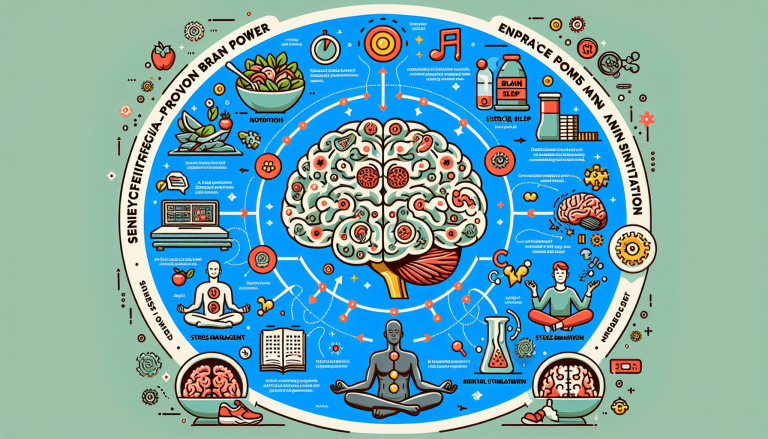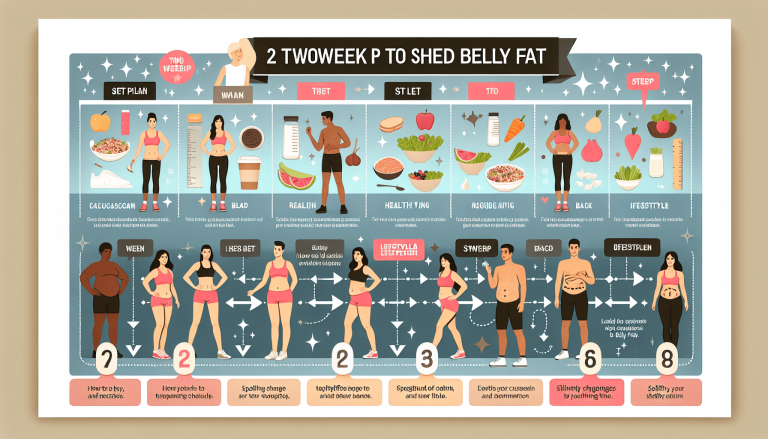What Is The Fastest Way To Lose Weight?
If you’re on a mission to shed some pounds and wondering what the fastest way is to achieve your weight loss goals, look no further. In this article, we will explore various effective strategies and techniques that can help you lose weight quickly and efficiently. From incorporating a balanced diet to engaging in regular physical activity, we’ve got you covered with proven tips and tricks. So, get ready to embark on your weight loss journey with confidence and watch those excess pounds melt away in no time. It’s time to discover the fastest path to a healthier, fitter you!

Choose a Calorie Deficit
Losing weight requires creating a calorie deficit, which means consuming fewer calories than your body needs. To start your weight loss journey, it’s important to calculate your daily calorie needs and create a realistic calorie deficit.
Calculate Your Calorie Needs
To determine your daily calorie needs, you can use an online calculator or consult with a registered dietitian. These calculators take into account factors such as age, gender, weight, height, and activity level to estimate how many calories your body requires to maintain its current weight.
Once you have your estimated daily calorie needs, you can create a calorie deficit by subtracting a certain number of calories. It is generally recommended to aim for a deficit of 500-1000 calories per day, which can result in a sustainable weight loss of 1-2 pounds per week.
Create a Realistic Calorie Deficit
While it may be tempting to drastically reduce your calorie intake in hopes of losing weight faster, it’s important to create a deficit that is realistic and sustainable. Extreme diets or very low-calorie intake can lead to nutrient deficiencies, muscle loss, and a slowed metabolism.
Instead, opt for a moderate calorie deficit that allows you to still enjoy a variety of nutritious foods while losing weight gradually. This approach is more likely to lead to long-term success and prevent any negative side effects.
Follow a Balanced Diet
Achieving and maintaining a healthy weight goes hand in hand with a balanced diet that consists of nutritious and whole foods. Here are some important guidelines to follow when it comes to your eating habits.
Focus on Whole Foods
To support your weight loss journey, prioritize whole foods that are minimally processed and rich in nutrients. These include fruits, vegetables, whole grains, lean proteins, and healthy fats. Whole foods tend to be more filling and provide essential nutrients while being lower in calories.
Fill your plate with a variety of colorful fruits and vegetables, as they are packed with vitamins, minerals, and fiber. Opt for whole grains like brown rice, quinoa, and whole wheat bread instead of refined grains. Lean proteins such as chicken, fish, tofu, and beans can help you feel satisfied and maintain muscle mass.
Limit Processed Foods and Added Sugars
Processed foods, such as packaged snacks, sugary beverages, and fast food, are often high in calories, unhealthy fats, and added sugars. These can sabotage your weight loss efforts and negatively impact your health.
Try to minimize your intake of processed foods and opt for healthier alternatives whenever possible. Instead of reaching for a sugary soda, choose water or unsweetened tea. Swap packaged snacks for fresh fruits or homemade options like vegetable sticks with hummus.
Include Lean Proteins and Fiber-Rich Foods
Including lean proteins in your meals can help promote satiety and preserve muscle mass during weight loss. Examples of lean proteins include skinless chicken or turkey, fish, eggs, low-fat dairy products, and legumes.
Fiber-rich foods, such as fruits, vegetables, whole grains, and legumes, can also aid in weight loss by helping you feel full and satisfied. They can also improve digestion and support overall gut health.
Drink Plenty of Water
Don’t forget to stay hydrated throughout the day. Drinking water can help boost your metabolism, curb hunger, and support overall health. Aim to drink at least 8 cups (64 ounces) of water daily, or more if you are physically active or live in a hot climate.
Increase Physical Activity
In addition to following a balanced diet, increasing your physical activity levels is crucial for weight loss and overall health. Incorporating a combination of cardiovascular exercises and strength training can help you burn calories, build muscle, and improve your fitness level.
Engage in Regular Cardiovascular Exercises
Cardiovascular exercises, such as jogging, cycling, swimming, or dancing, are excellent for burning calories and improving cardiovascular health. Aim for at least 150 minutes of moderate-intensity cardio per week, or 75 minutes of vigorous-intensity cardio if you prefer higher-intensity workouts.
Find activities that you enjoy and make it a part of your routine. Whether it’s brisk walking, taking a dance class, or playing a sport, find ways to keep yourself motivated and engaged.
Incorporate Strength Training
Including strength training in your exercise routine can help you build lean muscle mass, which in turn increases your metabolism and burns more calories. You can use dumbbells, resistance bands, or your body weight to perform exercises such as squats, lunges, push-ups, and planks.
Aim to strength train at least 2-3 times per week, targeting major muscle groups. If you’re new to strength training, consider working with a personal trainer to ensure proper form and prevent injuries.
Stay Active Throughout the Day
Aside from structured exercise sessions, it’s important to stay active throughout the day. Look for opportunities to move more, such as taking the stairs instead of the elevator, walking or biking instead of driving short distances, and incorporating physical activity breaks during sedentary periods.
Consider investing in a pedometer or fitness tracker to monitor your daily steps and set goals for yourself. Aim for at least 10,000 steps per day, and gradually increase your activity level over time.
Implement Intermittent Fasting
Intermittent fasting is an eating pattern that alternates between periods of fasting and eating. Many people find it to be an effective approach for weight loss, as it can help control calorie intake and improve metabolic health.
Choose a Suitable Fasting Schedule
There are various intermittent fasting schedules to choose from, so it’s important to find one that suits your lifestyle and preferences. Popular methods include the 16/8 method, where you fast for 16 hours and eat within an 8-hour window, and the 5:2 method, where you eat normally for 5 days and limit calories to 500-600 on 2 non-consecutive days.
Experiment with different fasting schedules and see what works best for you. It’s important to listen to your body and ensure you’re still meeting your nutritional needs during your eating windows.
Monitor Your Food Intake during Eating Windows
While intermittent fasting may allow more flexibility during eating windows, it’s essential to make mindful food choices. Focus on nutrient-dense foods and avoid excessive calorie intake. It’s still important to consume a balanced diet and ensure you’re meeting your body’s nutritional requirements.
Keep track of your eating patterns and listen to your body’s hunger and fullness cues. Pay attention to portion sizes, choose whole foods, and try to eat mindfully to fully enjoy your meals.

Manage Stress Levels
Stress can have a significant impact on weight management, as it can lead to emotional eating, hormonal imbalances, and disrupted sleep patterns. Taking steps to manage stress in your life can support both your mental and physical well-being.
Practice Stress-Reducing Techniques
Incorporate stress-reducing techniques into your daily routine to help manage stress levels. This can include activities such as deep breathing exercises, meditation, yoga, and mindfulness practices. Find what works for you and make it a priority to take time for self-care.
Ensure Sufficient Sleep
Adequate sleep is crucial for weight loss and overall health. Lack of sleep can lead to increased hunger hormones, decreased satiety hormones, and reduced motivation to engage in physical activity.
Make quality sleep a priority by establishing a consistent sleep routine, creating a relaxing sleep environment, and avoiding electronics before bed. Aim for 7-9 hours of sleep per night to support your weight loss efforts.
Engage in Regular Relaxation Activities
Engaging in activities that bring you joy and help you relax can also be beneficial for weight loss. Whether it’s reading a book, listening to music, taking a bath, or spending time in nature, find activities that help you unwind and reduce stress.
Get Adequate Nutrition
When pursuing weight loss, it’s important to ensure you’re still getting all the necessary nutrients your body needs to function optimally. Consulting with a registered dietitian or nutritionist can help you create a well-rounded eating plan that meets your nutritional needs while supporting your weight loss goals.
Consult with a Registered Dietitian or Nutritionist
Working with a registered dietitian or nutritionist can provide personalized guidance and support throughout your weight loss journey. They can assess your current eating habits, help you create a balanced meal plan, and provide education on portion sizes, food choices, and mindful eating.
They can also assist in identifying any nutrient deficiencies and recommend appropriate supplements if necessary. A registered dietitian or nutritionist can be a valuable resource and help ensure you’re getting adequate nutrition while losing weight.
Ensure Sufficient Intake of Vitamins and Minerals
When following a calorie-restricted diet, it’s important to ensure you’re still getting sufficient vitamins and minerals. Lean towards nutrient-dense foods that provide a wide range of essential nutrients.
If you’re concerned about meeting your nutritional needs, consider taking a high-quality multivitamin or specific supplements as recommended by a healthcare professional. However, keep in mind that a balanced diet and consulting with a registered dietitian should be the first priority for meeting your nutritional needs.

Stay Determined and Motivated
Maintaining motivation and determination throughout your weight loss journey is essential for long-term success. Here are some strategies to help you stay on track and achieve your goals.
Set Realistic Goals
Set realistic and achievable goals that are specific, measurable, attainable, relevant, and time-bound (SMART goals). This can help you stay focused and motivated as you track your progress. Break your overall weight loss goal into smaller milestones to celebrate along the way.
Remember that weight loss is a journey, and it’s normal to experience ups and downs. Stay committed to your goals and celebrate each small win as you make progress.
Track Your Progress
Tracking your progress can provide valuable insights and keep you accountable. Keep a food journal to record your meals and snacks, track your physical activity, and monitor your weight loss. There are many apps and websites available that can assist you in tracking your progress.
Don’t solely rely on the scale for progress measurements. Take body measurements, pay attention to how your clothes fit, and notice any improvements in energy levels, strength, and overall well-being.
Find Support and Accountability
Having a support system and accountability partners can greatly enhance your weight loss journey. Share your goals with close friends or family members who can provide encouragement and motivation. Consider joining a weight loss support group or seeking the guidance of a personal trainer or coach.
Having someone to share challenges, celebrate victories, and hold you accountable can make all the difference in keeping you motivated and on track.
Reward Yourself
Don’t forget to reward yourself along the way for reaching milestones and sticking to your healthy habits. Treat yourself to a non-food reward, such as a massage, a new workout outfit, or a relaxing day off. Celebrate your progress and acknowledge your hard work and dedication.
Consult a Healthcare Professional
For some individuals, weight loss may require additional support and guidance from a healthcare professional. If you have underlying health conditions, are taking certain medications, or have struggled with weight loss in the past, it’s important to consult with a healthcare professional.
Consider Medical Supervision
In certain cases, medical supervision may be necessary to ensure safe and effective weight loss. A healthcare professional can provide specialized guidance and monitor your progress, especially if you have a significant amount of weight to lose or have health concerns.
They can help determine if medical interventions, such as prescription weight loss medications or surgical procedures, are appropriate for your situation. It’s important to approach these options with caution and only under the guidance of a qualified healthcare professional.
Discuss Potential Weight Loss Medications or Procedures
Weight loss medications or surgical procedures may be options for individuals who have struggled to lose weight through lifestyle changes alone. However, these interventions are not suitable for everyone and should be discussed thoroughly with a healthcare professional.
Weight loss medications can help curb appetite or reduce the absorption of nutrients, but they come with potential side effects and should be used as part of a comprehensive weight loss plan. Surgical procedures, such as gastric bypass or gastric sleeve surgery, are invasive interventions that carry risks and require long-term lifestyle changes.

Avoid Crash Diets or Quick Fixes
While it may be tempting to try crash diets or quick-fix solutions in hopes of rapid weight loss, these approaches are often ineffective and unsustainable in the long run. To achieve lasting results, it’s important to focus on sustainable lifestyle changes.
Focus on Sustainable Lifestyle Changes
Instead of seeking temporary solutions, focus on making long-term changes to your lifestyle that you can maintain even after reaching your weight loss goals. Embrace a healthy eating pattern, regular physical activity, and stress management techniques as part of your everyday routine.
Remember that weight loss is not just about reaching a certain number on the scale but about improving your overall health and well-being. Slow and steady progress is more likely to lead to sustainable weight loss and a healthier lifestyle.
Be Patient with Your Journey
Weight loss is a gradual process, and everyone’s journey is unique. Be patient with yourself as you progress towards your goals. Keep in mind that sustainable weight loss is about making lasting changes to your habits and mindset.
Focus on the positive changes you’re making and the improvements to your overall health, rather than solely fixating on the number on the scale. Celebrate your progress, and remember that every small step counts towards a healthier and happier you.
Monitor and Adjust Your Approach
As you continue on your weight loss journey, it’s important to regularly evaluate your progress and make any necessary adjustments to your plan. Listen to your body, keep track of your habits, and be open to making changes if needed.
Regularly Evaluate Your Progress
Take time to assess your progress and reassess your goals regularly. Are you making consistent progress towards your goals? Are you experiencing any challenges or setbacks? What adjustments can you make to your eating habits or exercise routine to continue moving forward?
By regularly evaluating your progress, you can identify areas of improvement and make necessary changes to stay on track.
Make Necessary Adjustments to Your Plan
If you’re not seeing the desired results or have hit a weight loss plateau, it may be time to make adjustments to your plan. Consider working with a registered dietitian or fitness professional to help you troubleshoot any challenges you’re facing.
This may involve adjusting your calorie intake, modifying your exercise routine, or trying new strategies to overcome obstacles. Remember, weight loss is a journey, and it’s normal to need to make adjustments along the way.
In conclusion, the fastest way to lose weight involves a combination of creating a calorie deficit, following a balanced diet, increasing physical activity, implementing intermittent fasting if suitable for you, managing stress levels, getting adequate nutrition, staying determined and motivated, consulting a healthcare professional if necessary, and avoiding crash diets or quick fixes. It’s important to approach weight loss with a sustainable and long-term mindset, prioritizing your overall health and well-being. Remember, your weight loss journey is unique to you, and it’s important to tailor your approach to your individual needs and preferences. Stay consistent, patient, and focused, and celebrate each milestone along the way. With dedication and the right strategies, you can achieve your weight loss goals and maintain a healthier lifestyle for the long term.
Additional Resources

If you’ve been impressed by Ozempic, but price has kept it out of reach, there’s a new discovery you should know about.
After 30 years of intense research on over 24,237 patients in his weight loss clinic in Burke, VA… A renowned Board-Certified Doctor has revealed an exotic extract that cheats your body to melt 11lbs of stubborn fat a week. Every week!
But there’s a limit…
This “Nature’s Ozempic” is so effective, there’s a recommended limit on how much weight you should lose.
How much do you think that is?
a) 21 Ibs
b) 46.5 Ibs
c) 101 Ibs
d) 187 Ibs
e) 322 Ibs
Tap on your answer above or go to this page and find out when you should stop!







